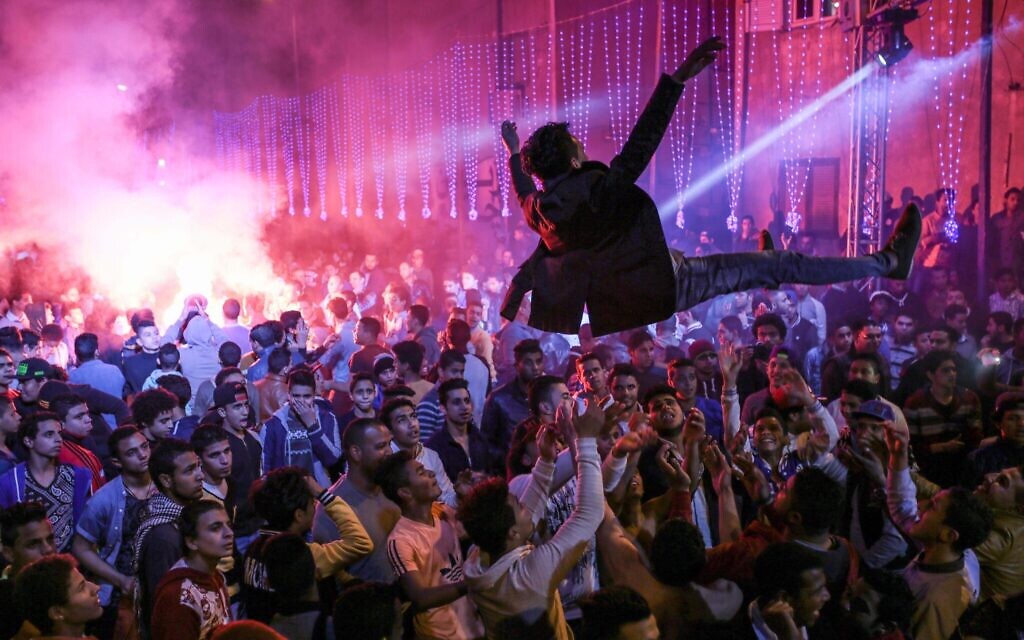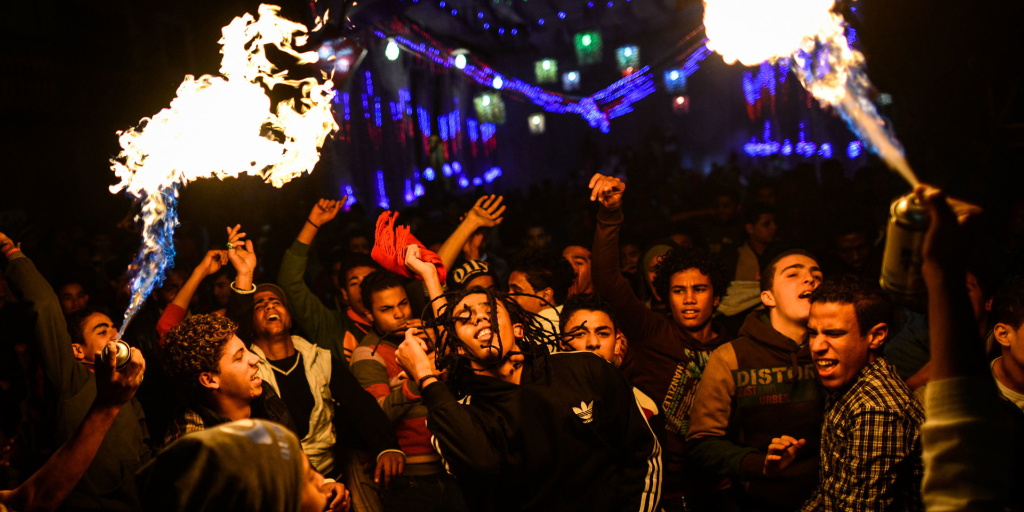Egypt’s mahraganat music (which literally translates to festival music) has been the topic of controversy arguably since the appointment of veteran singer, Hany Shaker, as the President of the Music Syndicate.
An evolving genre born from the impact of the 2011 Revolution, mahraganat blends a melodic style of singing with colloquial rap with the bustling beats of simple techno hip-hop filling in the backdrop. With a generation growing out of a revolutionary struggle, mahraganat was edgier, fresher, and brasher than anything in both the mainstream and indie scene at the time.
It rapidly took over as Egypt’s dominant form of street music. Despite its popularity, both the Syndicate and mainstream press continuously vilify and mock mahraganat artists.
What the Syndicate considers lowbrow music is, nonetheless, a relished genre for others, particularly the Egyptian working class. Listeners now found themselves in the crossfire of a war of culture between the Syndicate and the new wave of mahraganat music, as they try to understand where right and wrong lie.
MUSICIANS’ SYNDICATE: PRINCIPLED REGULATORS OR ARCHAIC SILENCERS?
Since Shaker’s proclamation against the genre, the Syndicate has undergone a purge of a plethora of mahraganat artists such as Hassan Shakoush, Mohamed Ramadan, and Magdy Shatta.
One mahraganat artist often targeted is none other than Hamo Bika, who is popular for his hits Wada’ Ya Donya Wada’ (Goodbye World, Goodbye) in 2019 and Enty Me’alema (You Are A Boss) in 2020.
Draped in ostentatious gold jewelry, donning a slick-black pompadour, a distinguishable soul patch, and a strident, rumbling voice, Bika is one of Egypt’s most polarizing mahraganat artists.
In an interview with Al-Dostor (The Constitution) in 2019, Shaker identified the genre’s music as unsophisticated, indicating that social class and cultural background plays a role in the conflict between the Syndicate and mahraganat singers.
“We tried as much as possible to combat this lowbrow art by banning performers from holding concerts and refusing to issue licenses [to them], and we also prohibited syndicate musicians from working with them,” said Shaker.
Bika was first on the Syndicate’s list of prohibited artists when it was revealed in November 2021. The artist failing the Syndicate’s required singing examination was cited as the primary reason.
Legally, the Syndicate regulates Egypt’s music scene into a mold that represents an artistically presentable image of Egypt. To Shaker and the Syndicate, certain mahraganat singers like Bika and Hassan Shakoush do not meet that standard.
Shakoush, unlike Bika, had already passed the vocal testing process by the Syndicate, yet was banned from performing due to behavioral issues and performing uncensored lyrics during a live televised event.
“This is not a simple matter of making a living [off music]. These are people who use certain words and phrases, and behave in aggressive ways. They should absolutely not be presented to audiences,” explained Shaker in an interview with Ahmed Moussa in 2022.
The Syndicate’s justification was apparent amid circulation of Bika’s viral video rant; he is seen aggressively threatening the institution and its head following his second failed attempt at the Syndicate’s singing test.
In other words, to become instated as a member of the Musicians’ Syndicate, artists’ singing skills are tested in front of a panel of judges appointed by the Syndicate. Bika was deemed unfit to sing based on the panel’s judgement during his test, and therefore, unfit to be a part of the Syndicate.
However, some believe that the Syndicate’s disapproval of mahraganat extends beyond the behavioral issues and vocal skills of the genre’s two frontrunners.
MUSIC OF THE PEOPLE OR SOCIETAL DECADENCE?

Image Credit: Daily News Egypt
Beyond the regulatory body of the Syndicate, a plethora of prominent Egyptian figures have also criticized the genre’s impact on society – from political representatives to fellow artists.
One parliamentarian, John Talaat, expressed his concerns in 2020 over the influence mahraganat lyrics and culture may have on younger generations. This was not the last time an MP would voice their disdain for mahraganat – banning the genre’s songs in public spaces was considered by certain members of parliament.
Following his reinstatement into the Syndicate after a nine-month-long ban, popular mahraganat singer, Omar Kamal, expressed his support for the Syndicate’s decision to ban certain musicians and regulate lyrics.
When asked, certain mainstream Egyptian artists have vocalized their support for mahraganat: the genre, for many, signaled evolution in music. Amr Diab, arguably modern-day Egypt’s most decorated musician, voiced his acceptance of mahraganat as a genre during an interview with Amr Adib in Al Hekaya (The Story) in 2020.
“The space [for musical tastes] has always been wide…audiences vary in tastes and cultures, and that means we need music [for everyone],” said Diab.
Bika expressed his frustration at the way certain sects of society, including the Syndicate, perceive him, highlighting the class divide he senses in the music scene during an interview with talk show host Asma Ibrahim in 2022.
“How do they see me? How do these people see me? Do they think I’m some pest or piece of garbage?…I’m sorry, with all due respect, to Mr. Hany Shaker, I am a human being.”
THE WAR ON NEW-WAVE MUSIC CONTINUES
As of this moment, Bika and Shakoush remain banned due to the controversy surrounding their careers. The ban as a whole incurred financial losses to those who were in the Syndicate’s blacklist.
At the same moment, mahraganat continues to gain popularity on a global scale. On 10 May, US-based record label, Reservoir Media, and UAE-based record label, PopArabia, acquired Egypt’s 100Copies music studio to further market the genre.
Acting and mahraganat sensation, Mohamed Ramadan, was the first artist signed to this initiative. Ramadan, who is currently on a regional music tour, is among the genre’s banned singers.
The vilification of mahraganat musicians impacts numerous other artists beyond Shakoush and Bika – artists who have risen in popularity across the last few years, such as Omar Kamal, 3enba, and Ahmed Moza among others.
However, the Syndicate has lifted bans from certain artists on the blacklist following their submission of official paperworks and passing the Syndicate’s singing test. The now-registered artists have been categorized as shaabi singers, as the Syndicate continues to deny the existence of mahraganat.
Despite the tight reins of the Syndicate, the artform’s popularity continues to increase, as listeners migrate to YouTube and streaming platforms in place of live performances.
“What is forbidden is desired,” explained experienced shaabi singer, Hakim, when asked about the ongoing prohibition during an interview with Amr Adib in 2021.
“If you leave it as it is, then only time will tell if this type of music lasts or not, based on what the people desire,” argues Hakim.







Comments (4)
[…] الرغم من أن فخ العرب مشهد في السنوات الأخيرة ، لم تكن مصر دائمًا مركزًا […]
[…] largely dominated by the Arab-trap scene in recent years, Egypt was not always a hub of rap and electronica. Mounir pioneered the […]